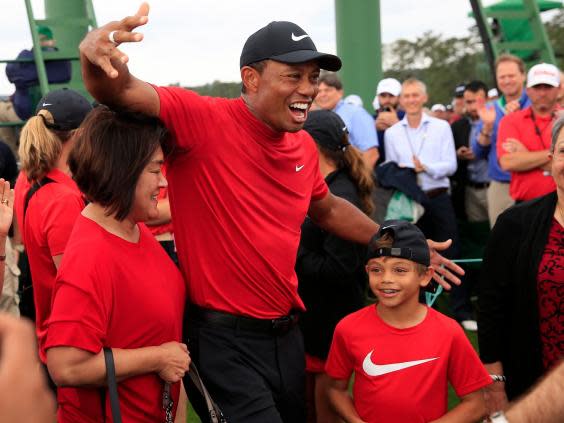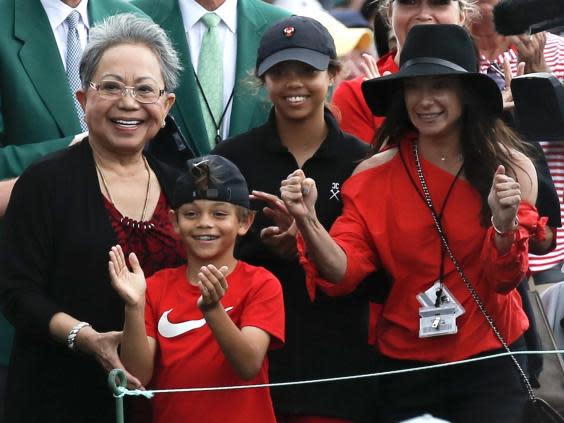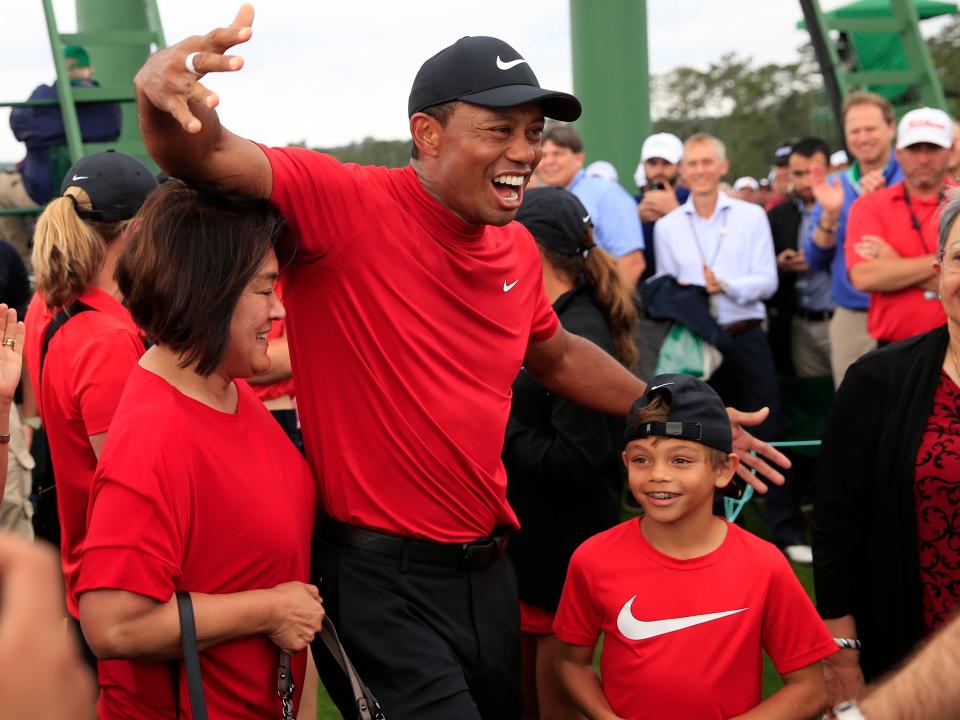The resurrection of Tiger Woods: Happy, winning the Masters again and reminding us golf is supposed to be fun
During those long months of convalescence, when the pain would sizzle through his joints like electricity, when walking was a daily struggle and swinging a club still a pipe dream, Tiger Woods began to despise golf so much that he could no longer even bear to watch it. Occasionally - perhaps during one of the big tournaments, or if a close friend was in contention - he would put it on. But always on mute. And always with another TV on showing something else. For one of the greatest athletes of his generation, obsession had turned to curse.
Curiously, Woods wasn’t the only person whose interest in golf was contingent on his being around to play it. As he sauntered up the 18th fairway at Augusta on Sunday afternoon, the crowds packed a dozen deep, television executives were celebrating record ratings. As he tapped in for his fifth Green Jacket and 15th major championship overall, the news was already reverberating well beyond the walls of the Augusta National, well beyond the world of golf and into the world at large. One week before Easter, the resurrection of Tiger Woods was complete.
One thing this wasn’t: a shock. Stop calling it a shock. It may have seemed unlikely some years ago, amidst those four back surgeries, the precipitous drop to No 1199 in the world rankings, the footage of him being arrested at the side of the road. But the moment Woods started playing golf seriously again, there was never the slightest chance he was doing it solely for kicks. Ever since his close run at Carnoustie last summer, his near miss at Bellerive in the US PGA, his win at the Tour Championship, this had been coming. “I mean, we keep saying like it’s surprising, but it’s not,” his friend Jason Day said last year. “It's Tiger Woods, for God’s sake.”
In fact, the only thing surprising about this triumph was the manner in which it was achieved. Not since 2005 had a player been outside the top 10 on Thursday and gone on to win. It was well documented that Woods had never come from behind after 54 holes. He didn’t even claim the lead until 66 holes, and then only fleetingly. Indeed, perhaps the only conventional aspect of Woods’s win at Augusta was his customary Sunday red.
But then, perhaps it’s hardly surprising that Woods doesn’t win like he used to. Very little remains of the player who rewrote the rules of golf between 1997 and 2008. The swing profile has been transformed, based less on pure brute force but on an immaculate rhythm and improved alignment. The ruthless front-runner who blew tournaments apart is now just as comfortable in the chasing pack, shoulder to shoulder with the younger players who grew up watching him.
Very little remains of the man, either. The inscrutable, occasionally surly winning machine of his peak years has been replaced by a happier, more rounded individual: pain-free and seemingly carefree, at peace with himself and at peace with others. He’ll crack jokes on the course, or chat genially with his playing partners. Or, as his former coach Sean Foley put it: “He realizes the bold approach he had all those years was necessary. But now, it’s not who he is any more.”
In a way, Woods has swapped heaviness for lightness. A few weeks ago, at the Players Championship, his playing partner Kevin Na raised a smile by bending over to pick his ball out of the cup while it was still on its way to the hole. A few seconds later, to riotous laughter, Woods did the same, and as the pair walked from the green in fits and giggles, we glimpsed an athlete who, at the age of 43, had finally struck open a long-cloistered truth: that at its heart, golf is supposed to be fun.
“There was a time when he was so focused on winning he lost out on some of the relationships that go on out here,” said his tour colleague Brandt Snedeker. “He’s embraced that the last five years, kind of opened up to a mentor role to the younger guys.”

Those long years of injury and rehab, as painful as they were, achieved something far more important still: they helped him to reconnect, to fix a personal life shattered by the death of his father Earl and his well-publicised marital infidelities. “The most important thing is that I get to have a life with my kids,” he admitted in a 2015 interview with Time magazine. “That’s more important than golf. I’ve come to realise that now.”
And so perhaps this triumph will mean more to him than most, because it was the first he won by truly being himself. Or rather, the first he won as himself. Even the most devoted Tiger-watchers wondered aloud whether the snarl was the cornerstone of his success: whether the tamed new Tiger could ever match the brutal old for pure, ice-cold menace.

Well, here was their answer. As he walked from the 18th green, a Masters champion again, the first people to greet him were his mother Kultida, his children Sam and Charlie, his new girlfriend Erica Herman. All around him, the galleries were on their feet, and like the millions watching on television you suspect they were united not simply in admiration for a great athlete, but in adoration for a changed man. Perhaps to conquer the world again, Tiger Woods first had to let it in.


